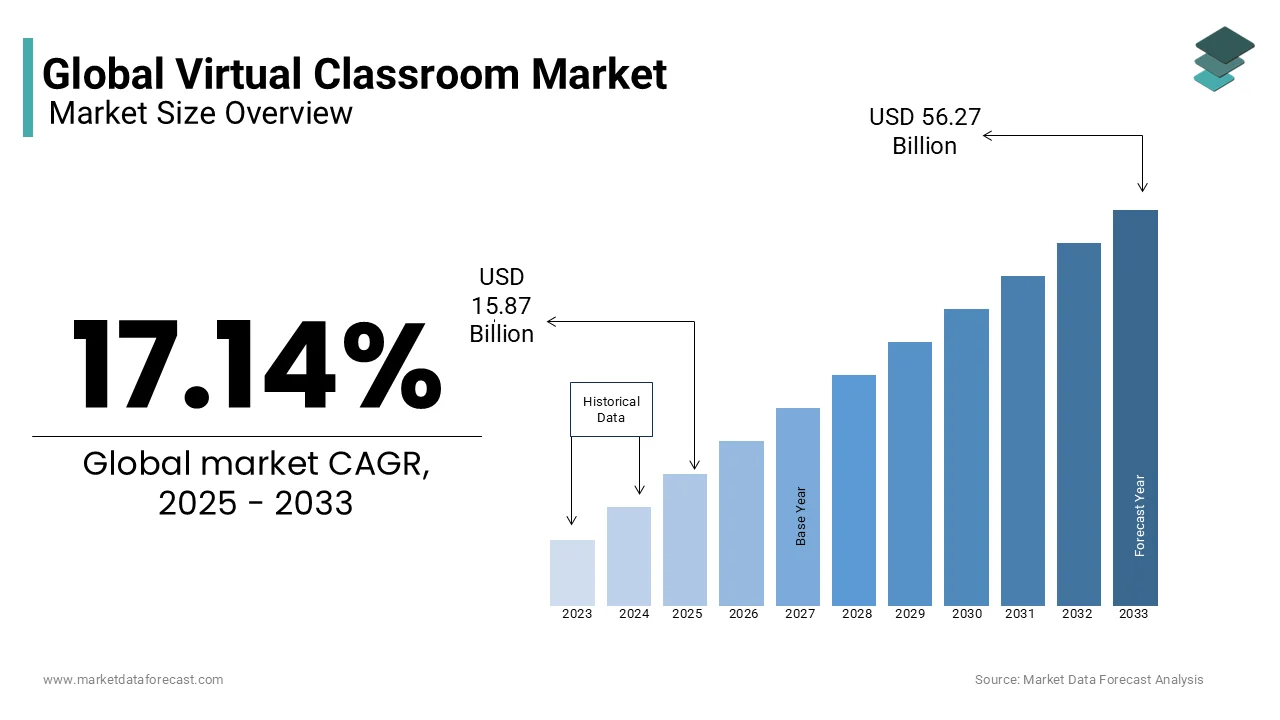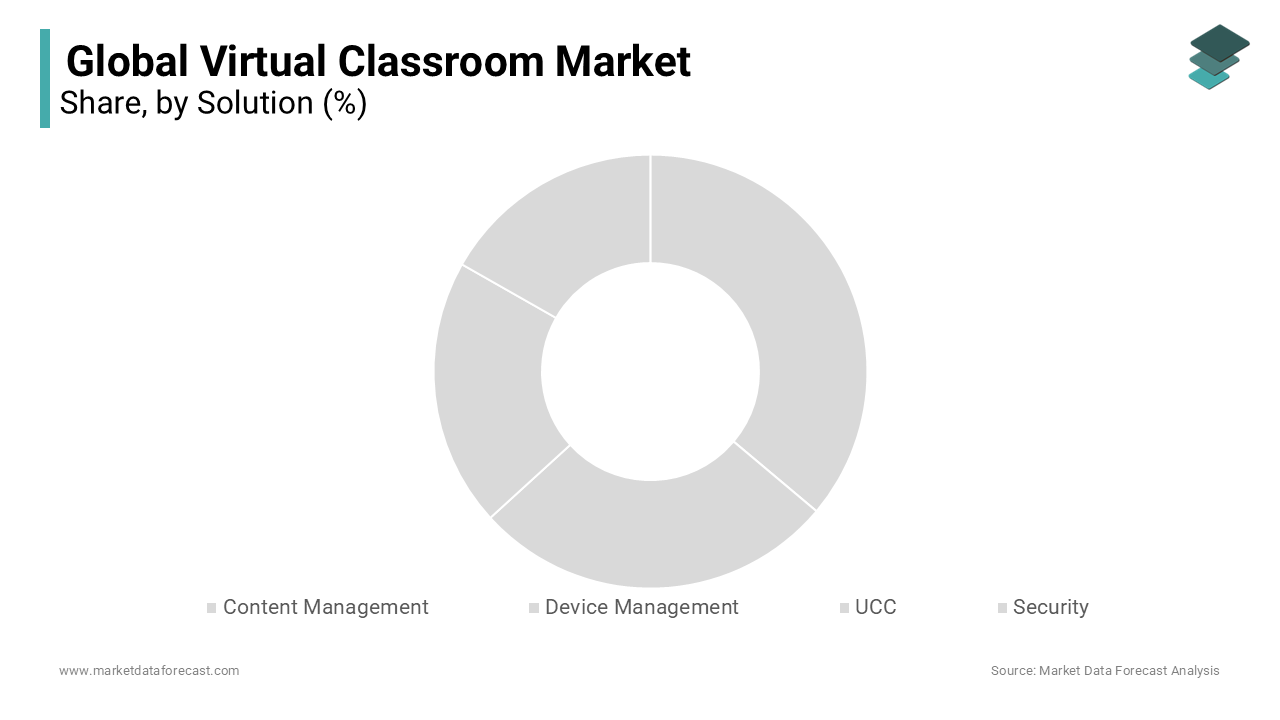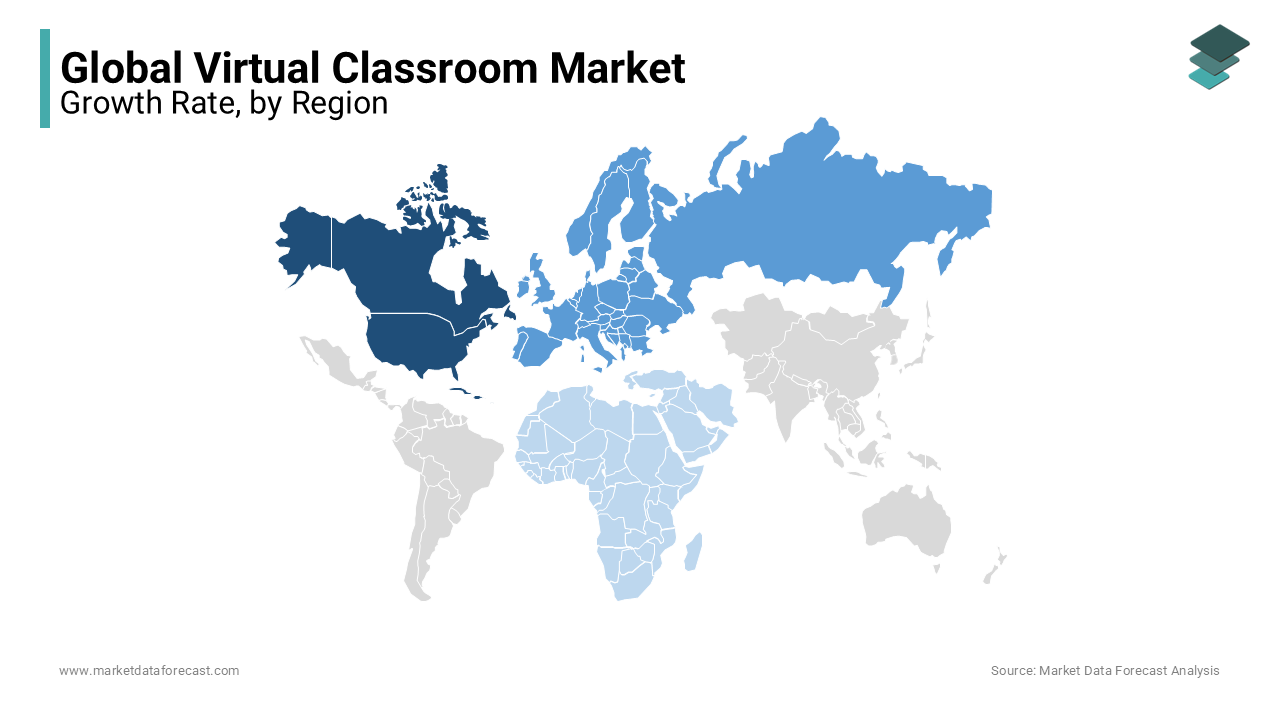Global Virtual Classroom Market Size, Share, Trends & Growth Forecast Report By Solution (Content Management, Device Management, UCC and Security), Hardware (Mobile Computing Devices and VR Devices), Service (Professional and Managed), Deployment Mode, User Type, & Region, Industry Forecast From 2024 to 2033
Global Virtual Classroom Market Size
The global virtual classroom market was worth USD 13.55 billion in 2024. The global market is predicted to reach USD 15.87 billion in 2025 and USD 56.27 billion by 2033, growing at a CAGR of 17.14% during the forecast period 2025 to 2033.

The virtual classroom can be defined as an electronic learning environment in which users can learn, interact, communicate, present, and discuss using various virtual classroom software, teleconferences, and web-based applications. Teleconferences allow companies and educational institutions to reduce travel time and increase productivity. Increase productivity by allowing remote employees to communicate with colleagues at headquarters. Companies can make long-distance calls and make strategic decisions. Teleconferencing systems include telephone access and free service that helps employees plan meetings at short notice. All these factors are raising the adoption of virtual classrooms, which is making remarkable growth in the market. The growing innovations in technology and the introduction of advanced facilities are expected to drive the market during the forecast period.
MARKET DRIVERS
The widespread adoption of AR or VR for training and business development is one of the major factors propelling the global virtual classroom market's growth.
Continuous innovation in VR / AR technologies, greater participation in learning, the demand for experiences, and the use of personalized learning are propelling the growth of the virtual classroom market. The emerging trend in the virtual classroom market is portability and scalable learning between employees and students, contributing to the growth of the global market. The systems also provide a content library for learning materials. The system can be approached by mobile devices and remote desktops. The virtual classroom market has witnessed remarkable growth, propelled by continuous technological advancements. Improved video conferencing tools facilitate seamless communication, transcending physical barriers and creating immersive virtual classrooms. Interactive whiteboards bring a dynamic dimension to teaching, allowing educators to present and annotate content in real time, fostering active participation. Augmented Reality (AR) applications elevate the virtual classroom experience, integrating digital elements into the physical environment and promoting interactive and experiential learning. These innovations collectively enhance engagement and effectiveness, offering a more enriching educational experience. As technology evolves, the Virtual Classroom market demand is poised for sustained expansion, providing educators and learners with cutting-edge tools that transcend traditional boundaries and unlock new possibilities in digital education.
The profound impact of the global shift towards digitalization in education is propelling the growth of the virtual classroom market. The relentless pace of technological innovation has led educational institutions and corporate training programs to embrace virtual classrooms as a pivotal component of this digital transformation. Recognizing the need for adaptable and dynamic learning environments, institutions worldwide are leveraging technology to transcend traditional boundaries. Integrating virtual classrooms facilitates seamless remote learning experiences, transcending geographical constraints and enhancing accessibility. This transformative approach addresses the challenges the modern educational landscape poses and underscores a commitment to fostering interactive, engaging, and compelling learning experiences. As the global digital transformation in education continues, the virtual classroom market remains at the forefront, catalyzing the evolution of contemporary learning methodologies.
MARKET RESTRAINTS
Security concerns pose a critical restraint to the widespread adoption of virtual classrooms. The increasing reliance on online education has heightened the risk of unauthorized approaches and data breaches, threatening the confidentiality of sensitive information. Virtual classrooms may become targets for malicious activities, raising apprehensions among educators, students, and institutions. Privacy issues, including collecting and storing personal data, demand robust safeguards to ensure compliance with regulations and build trust in virtual learning environments.
Technical glitches and downtime present significant restraints in the virtual classroom market, impeding the seamless delivery of education. Platform downtime, connectivity issues, and software glitches can disrupt the flow of virtual classroom sessions, leading to interruptions in learning and causing frustration among both educators and learners. Reliability is paramount in online education, and these challenges undermine the continuity and effectiveness of virtual learning experiences. As the virtual classroom market evolves, prioritizing the development of stable and resilient platforms becomes crucial to instill confidence in users, ensuring that technical disruptions do not hinder the potential of online education to provide accessible and uninterrupted learning opportunities.
MARKET OPPORTUNITIES
The virtual classroom market is expected to gain significantly from the integration of virtual reality (VR) and artificial intelligence (AI). The utilization of immersive virtual reality (IVR) has experienced a rise in demand for e-learning or study from home, though problems are declining in its adoption. The swift transition to digital learning in the last few years has boosted the need for unique educational technologies. IVR, which has the capability to produce exceedingly responsive and reciprocal experiences, carries a huge potential for changing online education. Besides this, with the advent of AI algorithms, VR educational scenarios can transform based on student's responses. Therefore, in the coming years, the market is believed to thrive even more.
MARKET CHALLENGES
The growth of the virtual classroom market is hampered by digital distractions and technology burnout. Digital diversions are on the increase in college classrooms, creating significant hurdles for student’s academic achievements. Study reveals that multitasking tendencies, particularly when students or apprentices are attending classes with off-task online activities which, negatively impact the learning results. Likewise, most teens or kids in the United States say that they get preoccupied when utilizing digital gadgets in class, and it contains few connections with their academic results, as per the outcomes of the Program for International Student Assessment in 2022. Apart from this, another factor affecting market growth is technology burnout. Today’s changing technology landscape is making it tough for companies to transition to another new or fresh platform or software
REPORT COVERAGE
|
REPORT METRIC |
DETAILS |
|
Market Size Available |
2024 to 2033 |
|
Base Year |
2024 |
|
Forecast Period |
2025 to 2033 |
|
CAGR |
17.14% |
|
Segments Covered |
By Solution, Hardware, Service, and Region |
|
Various Analyses Covered |
Global, Regional, & Country Level Analysis, Segment-Level Analysis, DROC, PESTLE Analysis, Porter’s Five Forces Analysis, Competitive Landscape, Analyst Overview on Investment Opportunities |
|
Regions Covered |
North America, Europe, APAC, Latin America, Middle East & Africa |
|
Market Leaders Profiled |
Sony (Japan), Samsung Electronics (South Korea), HTC (Taiwan), Google (US), Microsoft (USA), Panasonic Corporation (Japan), Hitachi (Japan), Barco (Belgium), LG Electronics (South Korea), Veative Labs (Singapore), Cisco (United States), Blackboard (United States), Dell (United States), IBM (United States), Saba Software (United States), Oracle (United States), Edvance360 (United States of America)), Electa Communications (United States), BrainCert (United States), SKYPREP (Canada), Impero Software(United Kingdom), WizIQ (India), BigBlueButton (United States), Digital Samba (Spain), TutorRoom (Taipei), and others. |
SEGMENTAL ANALYSIS
By Solution Insights
The content management segment led the market in 2024 and is expected to progress healthy during the forecast period. Learning content management is pivotal for organizing, delivering, and tracking educational content in the Virtual Classroom Market growth. With the emphasis on content customization and accessibility, this solution is crucial for providing a tailored and practical learning experience. Another major segment is device management, which is expected to account for a notable worldwide market share during the forecast period. Device management solutions are essential for maintaining a seamless virtual classroom environment. As the number of devices used for remote learning increases, effective management becomes critical for ensuring a smooth and secure educational process in the Virtual Classroom Market.

The UCC segment is expected to grow steadily during the forecast period. Unified Communication and Collaboration (UCC) enables real-time communication and collaboration, fostering engagement in virtual classrooms. The demand for interactive and collaborative learning experiences propels the dominance of UCC solutions in the virtual classroom market growth.
By Hardware Insights
The mobile computing devices segment dominated the global virtual classroom market with a significant share due to the affordability of the computing devices. The enhancing proliferation of various devices like laptops, tablets, and mobiles has made wider accessibility to the learning platforms, which is primarily driving the segment growth leading to global market expansion. The growing innovations in hardware solutions like noise-canceling microphones, high-quality webcams, and interactive displays are expected to accelerate segment growth during the forecast period.
The VR devices segment is estimated to have prominent growth in the coming years due to the increasing adoption of digital technology in the education system. The growing adoption of advanced technical devices that offer premium facilities and help people better understand them is enhancing the adoption rate, which will accelerate during the forecast period, boosting the market growth.
By Service Insights
The professional segment held a significant share of the global market revenue and is estimated to witness prominent growth further during the forecast period. The growing number of licensed and private institutions offering premium learning facilities is fueling the segment's growth.
REGIONAL ANALYSIS
North America has been a dominant force in the virtual classroom market through the presence of key market participants and the early adoption of innovative technologies. The Region is characterized by high internet penetration and a robust education technology landscape. Institutions in North America, including the United States and Canada, have embraced virtual classrooms for both academic and corporate training purposes.

Europe is the second significant player in the virtual classroom market share, strongly emphasizing digital transformation in education and corporate training. The Region also benefits from a well-established education system, government support for technology integration, and a tech-savvy population.
The Asia-Pacific region is experiencing rapid growth in the virtual classroom market. Its large population, rising demand for quality education, and expanding internet connectivity contribute to its growing dominance. Government initiatives also support digital education, fueling the market further in Asia-Pacific.
Latin America is gradually becoming a significant player in the virtual classroom market. The Region is witnessing a surge in virtual classroom adoption. Efforts to address digital inequality and improve connectivity contribute to Latin America's market growth.
The Middle East and Africa are increasingly adopting virtual classrooms, driven by a growing focus on technology-enhanced learning. The Region's commitment to modernizing education and addressing educational gaps contributes to the rising importance of virtual classrooms.
KEY PLAYERS IN THE MARKET
Companies playing a prominent role in the global virtual classroom market include Sony (Japan), Samsung Electronics (South Korea), HTC (Taiwan), Google (US), Microsoft (USA), Panasonic Corporation (Japan), Hitachi (Japan), Barco (Belgium), LG Electronics (South Korea), Veative Labs (Singapore), Cisco (United States), Blackboard (United States), Dell (United States), IBM (United States), Saba Software (United States), Oracle (United States), Edvance360 (United States of America)), Electa Communications (United States), BrainCert (United States), SKYPREP (Canada), Impero Software(United Kingdom), WizIQ (India), BigBlueButton (United States), Digital Samba (Spain), TutorRoom (Taipei), and others.
RECENT HAPPENINGS IN THE MARKET
- In January 2024, Google Classroom introduced several modern features to the learning process for transforming the educational technology landscape, from AI-powered topic recommendations to enhanced classroom management.
- In February 2023, HCP Cureblindness created the virtual classroom to fill gaps in ophthalmology residency education.
- In March 2023, Melbourne Business School introduced a new virtual classroom replicating the real classroom environment for online learning and executive education programs.
MARKET SEGMENTATION
This research report on the global virtual classroom market has been segmented and sub-segmented based on solution, hardware, service, and region.
By Solution
- Content Management
- Device Management
- UCC
- Security
By Hardware
- Mobile Computing Devices
- VR Devices
By Service
- Professional
- Managed
By Region
- North America
- Europe
- Asia-Pacific
- Latin America
- Middle East and Africa
Frequently Asked Questions
What factors contribute to the growth of the global virtual classroom market?
Sony (Japan), Samsung Electronics (South Korea), HTC (Taiwan), Google (US), Microsoft (USA), Panasonic Corporation (Japan) , Hitachi (Japan), Barco (Belgium), LG Electronics (South Korea), Veative Labs (Singapore), Cisco (United States), Blackboard (United States), Dell (United States), IBM (United States), Saba Software (United States), Oracle (United States), Edvance360 (United States of America)), Electa Communications (United States), BrainCert (United States), SKYPREP (Canada), Impero Software(United Kingdom), WizIQ (India) , BigBlueButton (United States), Digital Samba (Spain) and TutorRoom (Taipei) are the key players in the virtual classroom market.
Which regions hold the largest share in the global virtual classroom market?
The growing adoption of online education, advancements in technology, and the need for flexible and accessible learning solutions are majorly propelling the growth of the virtual classroom market.
What challenges does the global virtual classroom market face?
North America, Europe, and Asia-Pacific are among the regions holding the largest shares in the global virtual classroom market, with North America being a major adopter due to the prevalence of e-learning initiatives.
What industries beyond traditional education are driving the demand for virtual classrooms globally?
Concerns about the digital divide, ensuring equitable access to technology, and addressing issues related to engagement and interactivity in online learning are some of the major challenges to the growth of the virtual classroom market.
Related Reports
Access the study in MULTIPLE FORMATS
Purchase options starting from
$ 2500
Didn’t find what you’re looking for?
TALK TO OUR ANALYST TEAM
Need something within your budget?
NO WORRIES! WE GOT YOU COVERED!
Call us on: +1 888 702 9696 (U.S Toll Free)
Write to us: sales@marketdataforecast.com